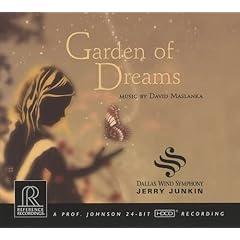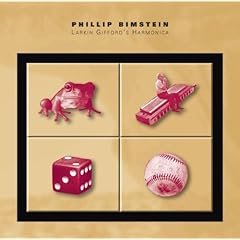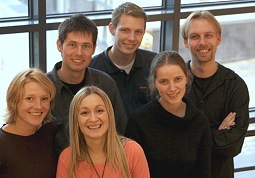 Garden of Dreams
Garden of Dreams
David Maslanka
Dallas Wind Symphony
Jerry Junkin
Writing for a large ensemble, especially a traditional, professional orchestra, can be a dangerous venture for today’s composer. Hours, days, and years (sometimes) of composition, orchestration, preparation of parts, and personal anguish over a score that may get two hours of concert hall rehearsal before a world premiere. However, should a wind ensemble ever ask for a commission, quickly say yes. Wind ensembles (symphonies, bands, etc), particularly collegiate groups, are gifted with practice time enviable by any orchestra and their directors tend to be excited about new music.
Jerry Junkin and the Dallas Wind Symphony have released 77 minutes of music by David Maslanka on the Reference Recordings label, proof that composers can get a break in today’s “orchestra-eat-composer” world. As far as I can tell, this recording was completely underwritten by someone other than the David Maslanka, and the performance quality leaves nothing to complain about.
The music itself combines Bach chorales as “emotional focal points” (composers words) and influences of John Adams, with long droning phrases and chords that build over time. The spaces can be wide, with little motion, but when David writes fast music, it it engaging and purposeful. A Child’s Garden of Dreams is based on the work of Carl Jung, and freely “describes” five dreams of a young girl who died of disease. In Memoriam is based on Bach’s “If Thou but Suffer God to Guide Thee.” The concluding work on this disc is a symphony, and is full of references to Bach chorales and hymn tunes, is predictable and forced (with a glaring reference to Philip Glass about two minutes into the first movement).
 Lion’s Eye/Lion’s Tale
Lion’s Eye/Lion’s Tale
Pauline Oliveros
The Berkley Gamelan Ensemble
Carter Scholz, HTML programmer and sampler performer
Pauline Oliveros, composer-performer, has been a transforming force in music since 1961. Her broad range of activities, from Deep Listening (Oliveros’ orginal concept) to performances on her just tuned accordion, have made her a unique and compelling voice in modern composition.
By their very nature, Oliveros’ works can’t be reviewed. Each performance is different and “correct,” with limitless freedom for the performers. The Berkeley Gamelan Ensemble with Carter Scholz using a sampler, tackles the forty-five minute Lion’s Eye from 1985. Oliveros’ writes for gamelans in a way that suits each instrument. Higher pitched instruments are given more notes, while lower pitched are given longer note values. The sampler allows patterns and pitches to be repeated or sustained at impossible levels, but also participates with the ensemble as another member.
Lion’s Tale for sampler (1989) uses composer created patterns that are generated by computer, allowing for a unique performance each time.
 tic
tic
Common Sense Composers’ Collective
New Millennium Ensemble
Rarely does one see the intentional joining of forces between composers. The competitiveness found in the performing arena is common in the composers’ world, though more passive-aggressive. Unfortunately, our animal desire to survive and rise above the pack isolates and divides us. So when a composers collective comes along, it can be refreshing to observe the fruits of friendship as expressed in the latest release through Albany Records of the Common Sense Composers’ Collective and the New Millennium Ensemble.
The performances by the New Millennium Ensemble are exciting and energetic (not to mention the very fine sound engineering). The composers represent an era influenced by Reich and Adams, jazz and rock, filtered through Guggenheims and Ivy League educations. Nothing sounds academic or contrived, and even when the post-minimalist clichés are apparent, the intensity and motivation behind the performance makes each work on this disc worthwhile.
 Props to our amigo Tom Steenland who has been producing great avant-garde recordings on his Starkland label from Boulder for many years now. It isn’t every day that a CD from a small label makes the New York Times but Phillip Bimstein’s Larkin Gifford’s Harmonica caught the attention of Steve Smith, who has livened up the Times immeasurably since he started writing over there. Steve reviewed it yesterday, opining that “… the irresistible charm of Mr. Bimstein’s music has less to do with technology than with his uncanny knack for finding the music of everyday life.” If you prefer, Tom has prepared a spiffy pdf file of the review and left it for you here. Daniel Gilliam reviewed the CD for us here.
Props to our amigo Tom Steenland who has been producing great avant-garde recordings on his Starkland label from Boulder for many years now. It isn’t every day that a CD from a small label makes the New York Times but Phillip Bimstein’s Larkin Gifford’s Harmonica caught the attention of Steve Smith, who has livened up the Times immeasurably since he started writing over there. Steve reviewed it yesterday, opining that “… the irresistible charm of Mr. Bimstein’s music has less to do with technology than with his uncanny knack for finding the music of everyday life.” If you prefer, Tom has prepared a spiffy pdf file of the review and left it for you here. Daniel Gilliam reviewed the CD for us here. Beth Anderson
Beth Anderson Claus is another composer I ran into on Myspace, and we’ve been corresponding for a few months now. Gahrn began his musical studies as a classical guitarist; from 2001 he studied composition and electroacoustic music at the Academy of Music in Esbjerg, Denmark, earning his MA degree with distinction in 2006. That’s Claus on the right in the photo, with his own young ensemble (including his pianist wife Malwina). There are links above that will take you both to Claus’ personal site, as well as that of the ensemble itself. Under “Media” at either, you’ll find excellent MP3 recordings and performances of Gahrn’s often-introspective yet just-as-often-edgy work.
Claus is another composer I ran into on Myspace, and we’ve been corresponding for a few months now. Gahrn began his musical studies as a classical guitarist; from 2001 he studied composition and electroacoustic music at the Academy of Music in Esbjerg, Denmark, earning his MA degree with distinction in 2006. That’s Claus on the right in the photo, with his own young ensemble (including his pianist wife Malwina). There are links above that will take you both to Claus’ personal site, as well as that of the ensemble itself. Under “Media” at either, you’ll find excellent MP3 recordings and performances of Gahrn’s often-introspective yet just-as-often-edgy work. Columbia University’s School of the Arts has given
Columbia University’s School of the Arts has given  Out my (Seattle) way, local composer and Seattle Weekly columnist Gavin Borchert this week offered up something titled “
Out my (Seattle) way, local composer and Seattle Weekly columnist Gavin Borchert this week offered up something titled “
 Garden of Dreams
Garden of Dreams Lion’s Eye/Lion’s Tale
Lion’s Eye/Lion’s Tale tic
tic Here’s a programming note to remember.
Here’s a programming note to remember.